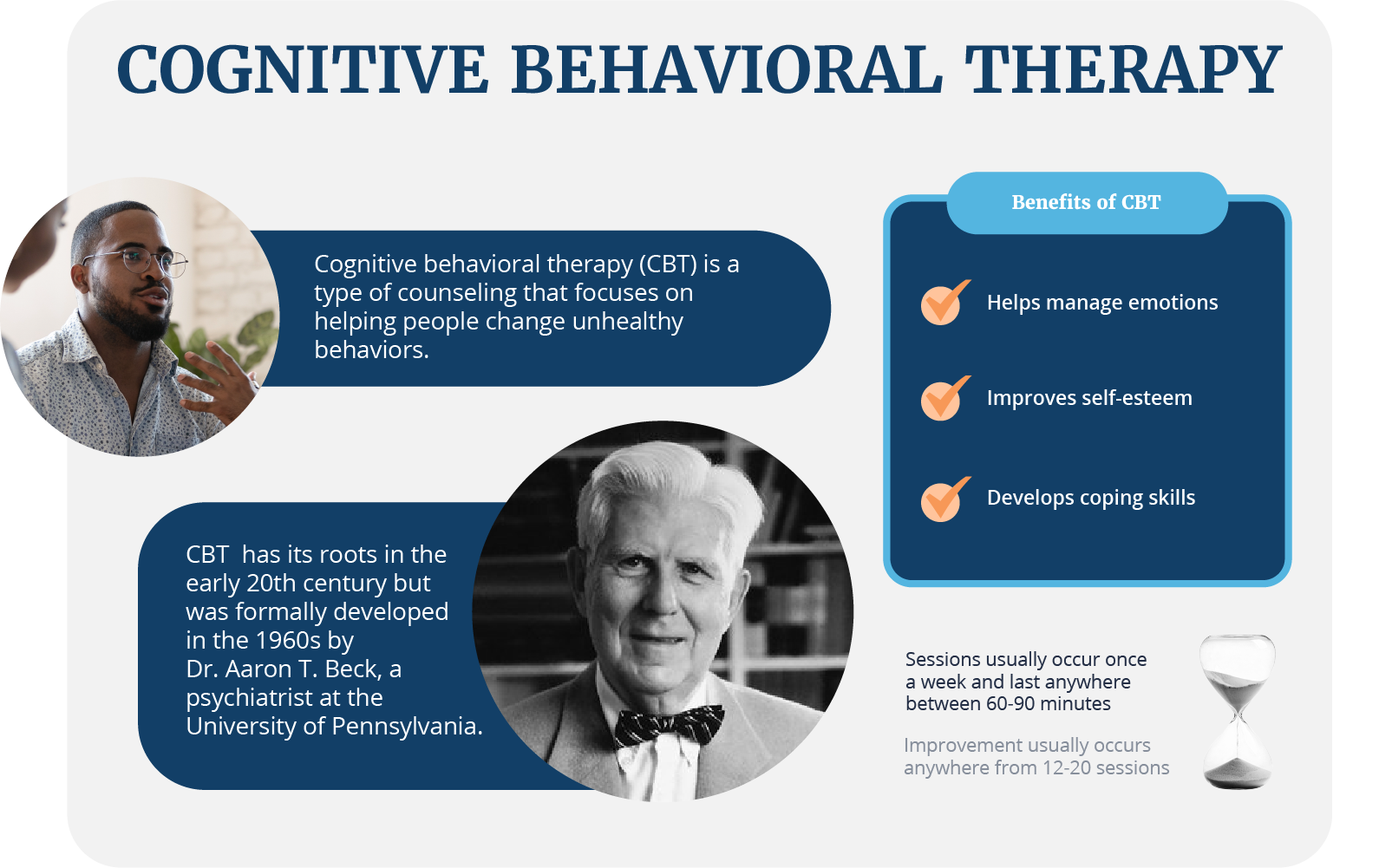Cognitive Behavioral Therapy (CBT)
If you or someone you care about is facing drug and alcohol dependence, it’s important to remember that there are ways to help.
Evidence-based behavioral therapies, such as cognitive behavioral therapy, are effective for treating alcohol and drug use disorders and are key components of recovery programs.
Cognitive behavioral therapy (CBT) has proven to be a successful approach in treating addiction and mental health disorders long-term. CBT can assist individuals dealing with a variety of challenges by providing the resources and coping skills needed for healing and recovery.
What is Cognitive Behavioral Therapy?
Cognitive behavioral therapy (CBT) is a type of psychotherapy developed in the 1960s by Aaron Beck. This type of addiction counseling combines aspects from both behavioral and cognitive therapies. CBT focuses on recognizing the link between thoughts, feelings, and behaviors.
This makes it an effective treatment for multiple mental health disorders, including anxiety issues, depression, and phobias, not only concerning substance use disorders but also other types of use cases. CBT is widely used to address a broad range of mental disorders, making it a versatile option for treating various psychological conditions.
Cognitive behavioral therapists mainly work with clients to identify negative thought patterns connected to any form of addiction tendencies before tackling them by challenging these beliefs while aiming towards developing healthier behaviors.
Core Components of CBT for Substance Abuse

CBT focuses on tackling substance use disorders with three components:
For those dealing with addiction and mental health conditions, cognitive behavioral therapy is an effective way to make progress. Cognitive behavioral therapists can help individuals recognize any detrimental beliefs or thought patterns that may be causing them to engage in substance use. These negative patterns, which often include recurring unhelpful thoughts and behaviors, are a primary focus of CBT interventions.
After this, techniques such as journaling, reframing thoughts, and challenging cognitive distortions are employed so people can build a healthier mindset that encourages recovery from their addictions instead of relapsing into more drug or alcohol dependence. By addressing these negative thinking habits head-on, CBT establishes the groundwork necessary for lasting healing from alcohol and drug addiction. Replacing such negative thoughts with positive emotions and thought processes can make all the difference in addiction recovery.
CBT is an effective technique to teach individuals how to develop positive coping strategies that replace destructive behaviors and negative thoughts. For substance abuse treatment, this includes learning skills like stress management, problem-solving, emotional regulation, practical skills, and effective communication skills to deal better with situations or triggers that could lead back to relapse. After all, negative thoughts and negative beliefs can be triggers that cause people to feel the need to use alcohol or drugs.
CBT equips individuals with the tools and skills necessary to develop healthier ways of coping, thinking, and behaving, which are crucial for relapse prevention. These newly acquired capabilities are essential for managing challenges that might come up during the recovery process. It allows people who have battled addiction problems a chance to observe their internal and external reactions more carefully so they can choose healthier solutions when feeling burdened by anxiety or distress.
CBT is an effective approach to tackling addiction and helps people gain insight into the underlying issues driving their drug abuse, including drug dependence. Mental health disorders and psychological disorders can be addressed through this method, as CBT facilitates uncovering past traumas or external factors that contribute to alcohol or drug abuse.
By dealing with these psychological concerns in a structured way, long-term recovery becomes more likely while lowering the risk of relapse. With a comprehensive outlook on mental well-being at CBT’s core, those suffering from mental illness can manage symptoms better while being empowered by attaining an understanding of why they have become dependent upon drugs or alcohol in the first place. As a result, cognitive behavioral therapy can provide people with motivation for lasting sobriety going forward.
CBT offers many advantages when it comes to treating co-occurring disorders due to how focused it is on getting down to root causes rather than just addressing surface-level matters alone. For such patients with co-occurring or complex psychological and behavioral profiles, tailored treatment considerations are essential. By digging deeper, individuals stand a much greater chance of achieving positive outcomes throughout life after rehabilitation.
Benefits of CBT for Addiction Treatment and Recovery
 CBT is an evidence-based treatment that works to end substance abuse, improve psychological functioning, and decrease relapse rates. It can also provide a comprehensive approach by addressing co-occurring issues, such as anxiety disorders. By being tailored to meet the individual needs of each patient, CBT ensures effective and positive outcomes. CBT can also support long-term recovery by helping individuals develop coping skills and maintain sobriety. It’s a powerful form of therapy when tackling various conditions involving both addictions and related mental illnesses.
CBT is an evidence-based treatment that works to end substance abuse, improve psychological functioning, and decrease relapse rates. It can also provide a comprehensive approach by addressing co-occurring issues, such as anxiety disorders. By being tailored to meet the individual needs of each patient, CBT ensures effective and positive outcomes. CBT can also support long-term recovery by helping individuals develop coping skills and maintain sobriety. It’s a powerful form of therapy when tackling various conditions involving both addictions and related mental illnesses.
Some of the benefits of the cognitive behavioral approach include the following:
- Provides interpersonal insight
- Improves communication skills
- Can enhance motivation for change
- Addresses the underlying causes of addiction
- Helps people develop healthy new coping skills
- Brings awareness to and corrects maladaptive behavioral patterns
- Treats addiction that co-occurs with anxiety disorders, bipolar disorder, depression, mood disorders, and other mental health conditions
- Helps better a person’s general well-being by working on existing or emerging behavioral patterns
- Equips people with relapse prevention skills training, including stress management, trigger identification, and more
Cognitive behavioral treatment and cognitive behavioral therapies are widely recognized for their effectiveness in treating substance use disorders and various mental health conditions. These evidence-based therapies are supported by extensive research and are effective in both individual and group therapy settings.
Our compassionate counselors are standing by to answer any questions you may have. After helping thousands of people over the last 50 years, we have the resources to help you and your family and all your individual needs.
CONTACT US
Find out how we can help
Our compassionate counselors are standing by to answer any questions you may have. After helping thousands of people over the last 50 years, we have the resources to help you and your family and all your individual needs.
CBT Techniques for Addiction Recovery and Treatment
 Cognitive behavioral interventions are frequently used to treat addiction. These strategies include cognitive restructuring, which replaces pessimistic and irrational ideas with positive ones, and exposure therapy. Functional analysis is also a key method in CBT, helping to identify the triggers, causes, and consequences of substance use. CBT addresses a range of issues, including drug or alcohol use, drug use, and other drugs, by targeting the psychological and behavioral factors involved.
Cognitive behavioral interventions are frequently used to treat addiction. These strategies include cognitive restructuring, which replaces pessimistic and irrational ideas with positive ones, and exposure therapy. Functional analysis is also a key method in CBT, helping to identify the triggers, causes, and consequences of substance use. CBT addresses a range of issues, including drug or alcohol use, drug use, and other drugs, by targeting the psychological and behavioral factors involved.
Exposure therapy is utilized mainly if the individual struggles with trauma or anxiety related to their dependence on substances. Also, setting objectives as well as performing activities that help promote healthier behavior – all of these form a strong basis for lasting recovery. Relapse prevention in CBT involves identifying high-risk situations and developing strategies to manage them effectively.
Behavioral experiments play an essential role in CBT treatment for addiction. Through trial-and-error approaches, individuals can understand how they feel about certain situations without relying too much on addictive behaviors, such as substance use, as coping mechanisms. Skills training is also emphasized, with skill building being a core component of CBT for substance abuse, helping individuals develop healthier habits and coping strategies.
When it comes to tackling drug and alcohol addiction, cognitive behavioral therapy can be integrated with other treatments for a well-rounded approach. Medication management, family therapy, and motivational enhancement therapy can all work with CBT to help people overcome substance misuse. Behavioral therapies, including CBT and other approaches like contingency management, play a crucial role in comprehensive addiction treatment by addressing various aspects of substance use disorders.
Taking part in support groups such as Alcoholics Anonymous (AA), Narcotics Anonymous (NA), and SMART Recovery can help individuals on the road to recovery be more successful. Such entities provide both valuable aid and a community atmosphere that reinforces techniques learned during CBT sessions. For those struggling with alcohol use disorder specifically, connecting with these organizations has been proven valuable time after time.
CBT is a remarkably versatile form of therapy that can be adapted to suit each individual’s needs and used in various settings, such as one-on-one sessions with professionals, family meetings, or during admission at either outpatient clinics or hospitals. Through personalized approaches and the incorporation of strategies that focus on learning skills for managing addiction triggers (like coping mechanisms), individuals are empowered to take charge of their lives while finding stability within sobriety.
The approach CBT offers allows participants to identify potential roadblocks along recovery routes as well as discover more effective ways they could address them, so constructive problem-solving abilities may arise from it. In this way, substance misuse will no longer be an option to consider; instead, alternatives shall prevail through self-mastery, encouraging change toward healthier lifestyles free from reliance upon substances.
Organizations such as the National Institute on Drug Abuse and the Mental Health Services Administration provide support and guidelines for implementing evidence-based treatments like CBT in a variety of clinical and community settings, helping to ensure effective and accessible care.
Long-Term Recovery Support
Achieving sobriety is just the beginning—maintaining it over the long term requires ongoing support and effective strategies. Cognitive behavioral therapy (CBT) plays a vital role in long-term recovery by equipping individuals with the tools they need to manage stress, regulate emotions, and handle cravings that may arise after formal addiction treatment ends. CBT helps individuals develop a sense of purpose, build resilience, and foster meaningful connections with friends and family, all of which are essential for sustained recovery.
By integrating CBT with other treatment strategies, such as support groups and medication-assisted treatment, individuals can access a comprehensive support system that addresses both the psychological and practical aspects of recovery. This ongoing behavioral therapy not only helps prevent relapse but also enhances overall quality of life, empowering individuals to thrive in their long-term recovery journey.
Insurance Coverage for CBT and Addiction Treatment
 Access to effective addiction treatment, including cognitive behavioral therapy (CBT), is crucial for individuals seeking to overcome a substance use disorder. Fortunately, many insurance plans—including Medicaid and Medicare—provide coverage for CBT and other behavioral therapy options. The Affordable Care Act has further expanded access by requiring most insurance plans to cover mental health and substance use disorder services, ensuring that more people can benefit from evidence-based, effective treatment. It’s important for individuals to review their insurance policies and consult with their providers to understand the extent of their coverage and to find addiction treatment facilities that accept their insurance. By making treatment more affordable and accessible, insurance coverage plays a key role in supporting long-term recovery and helping individuals reclaim their health and well-being.
Access to effective addiction treatment, including cognitive behavioral therapy (CBT), is crucial for individuals seeking to overcome a substance use disorder. Fortunately, many insurance plans—including Medicaid and Medicare—provide coverage for CBT and other behavioral therapy options. The Affordable Care Act has further expanded access by requiring most insurance plans to cover mental health and substance use disorder services, ensuring that more people can benefit from evidence-based, effective treatment. It’s important for individuals to review their insurance policies and consult with their providers to understand the extent of their coverage and to find addiction treatment facilities that accept their insurance. By making treatment more affordable and accessible, insurance coverage plays a key role in supporting long-term recovery and helping individuals reclaim their health and well-being.
Receive the Support You Need at Discovery Institute
 The Discovery Institute in New Jersey provides tailored therapeutic techniques to assist those dealing with addiction and substance abuse. Our expertise ensures comprehensive care for both alcohol and drug use disorders. With a team of counselors and addiction treatment professionals, we offer an evidence-based approach that enables individuals to successfully recover while building skills for long-term success.
The Discovery Institute in New Jersey provides tailored therapeutic techniques to assist those dealing with addiction and substance abuse. Our expertise ensures comprehensive care for both alcohol and drug use disorders. With a team of counselors and addiction treatment professionals, we offer an evidence-based approach that enables individuals to successfully recover while building skills for long-term success.
Therapy can be a highly beneficial treatment option for those who suffer from substance abuse and common co-occurring disorders. This approach to recovery targets the underlying causes of addiction and provides individuals with essential coping skills that enable them to manage difficult emotions, thereby resulting in lasting healing and sobriety.
If you or someone close is struggling with a substance use disorder, don’t delay seeking help. Cognitive behavioral therapy and other substance abuse treatment programs and strategies could offer an effective long-term solution. Our New Jersey drug addiction treatment center is here for you. Don’t wait any longer; take control of your life by contacting us today to learn about the best options available for recovery.




